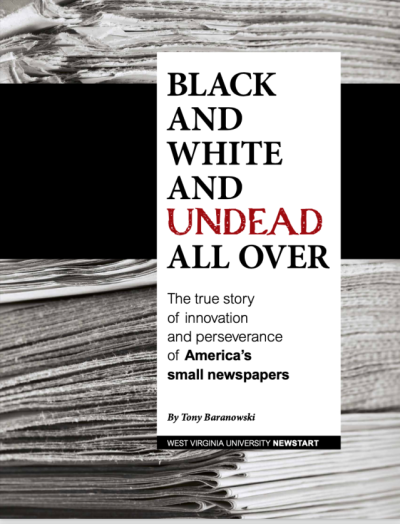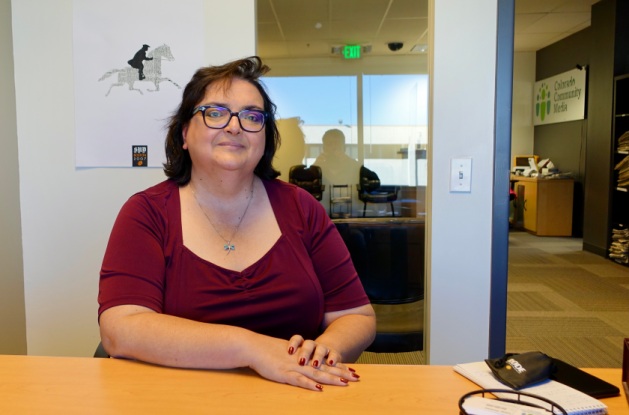 It’s something I’ve seen over and over in tracking the state of local news for the past dozen years. Despite the very real challenges community journalism faces from technological and cultural change, news organizations that are not burdened by corporate chain ownership can continue to serve as vital, financially sustainable operations.
It’s something I’ve seen over and over in tracking the state of local news for the past dozen years. Despite the very real challenges community journalism faces from technological and cultural change, news organizations that are not burdened by corporate chain ownership can continue to serve as vital, financially sustainable operations.
A new report by Tony Baranowski, director of local media for Times Citizen Communications in Iowa Falls, Iowa, makes the point. While he was a fellow at the West Virginia University Reed College of Media and the West Virginia Press Association’s NewStart Program, he studied several newspapers in the Upper Midwest in depth and surveyed more than 50 small newspaper publishers across the country.
Become a member of Media Nation for just $5 a month!
What he found was that, despite the narrative that local newspapers are dying, these independent papers were keeping their heads above water. Baranowski writes:
The strongest community news outlets are locally owned and managed by families or individuals with local ties that stretch back decades. That’s not an easy circumstance to replicate for a would-be publisher looking to buy or launch a news organization in a rural town, but it’s not a prerequisite, either. In fact, the common denominator is less longevity than fostering community spirit and pride within both staff-generated content and advertising in a traditional newspaper’s pages.
Among the people interviewed in Baranowski’s report is Jim Slonoff, the co-founder and publisher of The Hinsdalean, a free paper launched in suburban Chicago in 2006. I wrote about The Hinsdalean a couple of months ago to highlight its practice of signing up members of the community to write essays on a variety of topics. Although running unpaid columns is hardly new territory for local newspapers, The Hinsdalean actively recruits writers and limits them to a two-year term, ensuring a steady stream of fresh voices.
Like many of the people Baranowski spoke with, Slonoff said The Hinsdalean’s emphasis remains on print rather than digital. Slonoff said:
That’s the thing I don’t get about newspapers in general, because so many of them put so much money and resources into their websites with no return. We took the 180 degrees approach and said our money is coming from display advertising and real estate advertising. Why would we not focus on that? Facebook doesn’t bring us any money, Twitter and Instagram don’t. There’s nothing I get out of it that I know of, except we’re there. And we get a lot of likes and things and get a lot of this and comments and that feels good.
That might seem like a retrograde approach, but it’s one I’ve heard from a number of publishers who have to figure out how to break even.
The Provincetown Independent actually charges more for digital subscriptions than for a print-plus-digital combination, telling readers that “if we were to go online only, the savings in not having to print and mail the paper would not be anywhere near enough to make up for the loss of print advertising revenue.”
Last week I interviewed Jerry and Ann Healey, who sold their Colorado Community Media newspaper group earlier this year to The Colorado Sun, a start-up digital news organization, in a deal put together by the National Trust for Local News. They told me that, in many cases, when they offered a package combining digital and print, their advertisers weren’t interested — they wanted to be seen in the print newspaper. “In the community newspaper space, print is still a viable thing,” Jerry Healey said, “and the advertisers know that too.”
Then there’s Kris O’Leary of Central Wisconsin Newspapers, who told Baranowski that her readership includes Amish and Mennonite communities. Not much digital potential there.
Another of Baranowski’s findings is that newspapers with offices in the communities they cover tend to be healthier than those that have consolidated operations far from the people they serve.
If this sounds like Baranowski is recommending a back-to-the-future approach, it may be because he’s surveying local journalism in the rural heartland. A digital-first approach makes sense in affluent urban and suburban areas where readers can be persuaded to sign up for online-only subscriptions.
But in some parts of the country, technological advances have not changed the media all that much over the past several decades. It is in such places that journalism can do well by following a model that would have been familiar to our grandparents — independently owned newspapers, rooted in the community and supported by local businesses.










